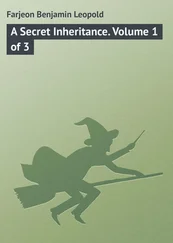Benjamin Farjeon - The Betrayal of John Fordham
Здесь есть возможность читать онлайн «Benjamin Farjeon - The Betrayal of John Fordham» — ознакомительный отрывок электронной книги совершенно бесплатно, а после прочтения отрывка купить полную версию. В некоторых случаях можно слушать аудио, скачать через торрент в формате fb2 и присутствует краткое содержание. Жанр: foreign_prose, на английском языке. Описание произведения, (предисловие) а так же отзывы посетителей доступны на портале библиотеки ЛибКат.
- Название:The Betrayal of John Fordham
- Автор:
- Жанр:
- Год:неизвестен
- ISBN:нет данных
- Рейтинг книги:5 / 5. Голосов: 1
-
Избранное:Добавить в избранное
- Отзывы:
-
Ваша оценка:
- 100
- 1
- 2
- 3
- 4
- 5
The Betrayal of John Fordham: краткое содержание, описание и аннотация
Предлагаем к чтению аннотацию, описание, краткое содержание или предисловие (зависит от того, что написал сам автор книги «The Betrayal of John Fordham»). Если вы не нашли необходимую информацию о книге — напишите в комментариях, мы постараемся отыскать её.
The Betrayal of John Fordham — читать онлайн ознакомительный отрывок
Ниже представлен текст книги, разбитый по страницам. Система сохранения места последней прочитанной страницы, позволяет с удобством читать онлайн бесплатно книгу «The Betrayal of John Fordham», без необходимости каждый раз заново искать на чём Вы остановились. Поставьте закладку, и сможете в любой момент перейти на страницу, на которой закончили чтение.
Интервал:
Закладка:
"Where is the lady's brooch you bought in Paris?" she asked. "Show it to me, and I'll be satisfied. Well, where is it?"
Then I recollected that Annette had passed through the room of the hotel in Paris when I emptied my pockets there; I was looking at the brooch, debating what I should do with it.
"You are thinking what to say," Barbara continued. "I will save you the trouble of inventing a lie. Say that you bought it for me."
"It would be the truth. I did buy it for you."
"Give it me, then; it belongs to me."
"I cannot give it to you; I have parted with it."
"I knew it without your telling me. You gave it to the other woman."
"There is no other woman in the case. Be reasonable, Barbara. Things are bad enough, God knows, but I can honestly say you have no cause for jealousy. The brooch was intended for you, but I changed my mind, and returned it to the jeweler."
"Not thinking it suitable for me."
"Exactly. I did not think it suitable for you."
"The device was not appropriate, eh?"
"It was not appropriate."
"I wonder you are not ashamed to look me in the face. It was a device of two hearts entwined – yours and another woman's – and it was not a suitable device to offer to me, whom you had married but the day before!" (I thought with dismay that Annette must have sharp eyes to have seen it in that brief moment when she passed me, looking slyly on the ground.) "You are a clumsy liar, John. If you want to know, it was because I was maddened by your shameful conduct that I left you last night. I was sorry for it afterwards. I reasoned with myself, saying, He is my husband, and it is my duty to be by his side. That is why I was not sorry when you found me this morning. You may break my heart, but I will never leave you again, never, never! Now that I have found you out don't presume to lecture me again upon any little faults I may have – but keep your women out of my sight, my dear."
I argued no longer; my heart was filled with bitterness; the smallest of my actions was turned against me with such ingenuity as to render me powerless.
I will not dwell upon the incidents that enlivened the remaining weeks of this mockery of a honeymoon. Again and again did I find Barbara under the influence of drink, and again and again did I seek refuge in silence, for every word I spoke was twisted into an accusation against myself. We saw nothing of Maxwell, and after a month's tour Barbara declared she was tired of foreign countries and foreign people, and yearned to take her proper place in our dear little home in London. "Where you will discover," she said (she was in one of her amiable moods), "that I am a model wife, and a perfect treasure of a housekeeper."
We were in London nearly two months before we settled in our new home, which, as I have stated, was situated in West Kensington. Immediately upon our return Barbara and I drove to the house, and took a tour of inspection through the rooms. It seemed to me that a few days would suffice for the necessary alterations and additions, but Barbara was of a different opinion. This piece of furniture did not suit her, that would not do, the other was altogether out of place. She did not like the paper on the walls, the ceilings were frightful, the patterns of the carpets horrible. Before our marriage we had come to London to see the house, and then she was satisfied with everything, now she is satisfied with nothing. If I ventured to make a remonstrance her reply was:
"Do let me manage! What can you know about domestic affairs? Leave them to me; I will soon put things to rights."
Seeing that her idea of putting things to rights would cost a large sum of money, I said:
"Remember, Barbara, I am not a millionaire."
"Perhaps not," she answered, "but you have thousands and thousands of pounds, you stingy fellow, and we must commence comfortably. Our whole happiness depends upon it. I sha'n't ruin you, my dear. Besides, are you not going to coin money out of your books?"
"They have to be written first."
"Of course. And to write striking stories you must have a cosy study. Do you think it is my comfort I am looking after? My dear old boy, you shall have the snuggest den in London."
"When they are written – if they ever are" – I was tortured by a doubt whether my mind would be sufficiently at ease for literary work – "they may not find favor with the publishers."
"I will manage them, John. Don't meet troubles half way. There is a clever song – did you ever hear it? – 'Never trouble trouble till trouble troubles you.' That is what I call common sense."
The result was that she had her way. My one desire was for peace. Love held no place in my heart The utmost I could hope for was that I should not be plunged into disgrace.
I had very little to do with the new arrangements of the house. Finding that every suggestion I made was received with opposition, I became wearied with the whole affair, my share in which was limited to paying the bills. This exactly suited Barbara, who now and then rewarded me by declaring that she was having a delightful time. During these few weeks we lived in a furnished flat in Bloomsbury, and having nothing else to do, I spent the greater part of the day in the reading-room of the British Museum, for which I had held a ticket since I left my stepmother's house. Barbara and I would breakfast together in the morning, and make arrangements for a late dinner. Then we would separate; Barbara for West Kensington, accompanied by Annette, I for the British Museum, or for a lonely walk or ride. Once or twice a week, when the weather was fine, I would ride on the top of an omnibus to its terminus, and return to my starting-point by the same conveyance. My favorite ride was eastward, through Whitechapel, and occasionally I would alight in the centre of that wonderful thoroughfare – where a greater variety of the forms of human life can be met than in any other part of the modern Babylon – and plunge into the labyrinth of narrow streets and courts with which the district abounds. What made the deepest impression upon me in my wanderings thereabouts was the poverty of the residents and the immense number and the magnificence of the gin palaces, in the immediate vicinity of the most flourishing of which were usually congregated groups of wretched men, women and children – chiefly the latter during the midday hours of my visits – whose one idea of life and life's duties was drink. The subject had a fascination for me, and my heart sank as I noted the hideous degradation to which it brings its victims. The soddened, bestial faces, the shameless lasciviousness, the frightful language, the hags of forty who looked seventy, the young children with preternatural cunning stamped on their features, and from whose ready tongue familiar blasphemies proceeded; girl-mothers with exposed breasts putting glasses of gin to their babies' lips – these were horrible and common sights. I was standing watching such a scene in a narrow, squalid street, flanked at each corner by a gorgeous, shining palace of gin, when I noticed a policeman at my side. We entered into conversation, and I learned that he had placed himself near me as a protection.
"A famous thieves' quarter this, sir," he said; "I thought you mightn't know."
"Thank you for the warning," I replied; "the people are very poor; all the houses seem to be tumbling down."
"They belong to a big swell."
"Does he not come to inspect them?"
The policeman – an intelligent man, evidently with some education – laughed. "He may have seen them once in his lifetime, and that was enough for him. The property is managed by an agent, in the employ of the steward of the estate, who walks through it perhaps once a year."
"The rents must be very low."
"Not low enough for them that live here. There isn't a house in the street with less than three or four families in it."
Читать дальшеИнтервал:
Закладка:
Похожие книги на «The Betrayal of John Fordham»
Представляем Вашему вниманию похожие книги на «The Betrayal of John Fordham» списком для выбора. Мы отобрали схожую по названию и смыслу литературу в надежде предоставить читателям больше вариантов отыскать новые, интересные, ещё непрочитанные произведения.
Обсуждение, отзывы о книге «The Betrayal of John Fordham» и просто собственные мнения читателей. Оставьте ваши комментарии, напишите, что Вы думаете о произведении, его смысле или главных героях. Укажите что конкретно понравилось, а что нет, и почему Вы так считаете.












